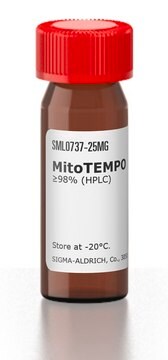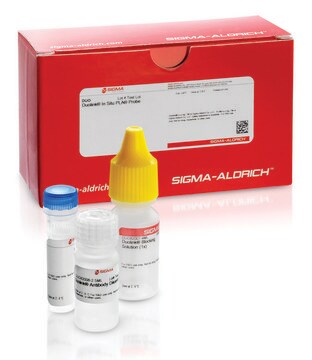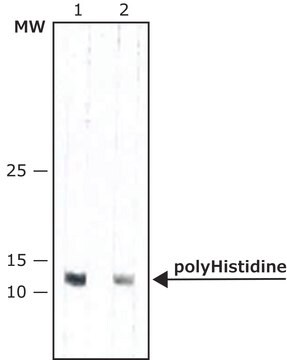A0185
Monoclonal Anti-Biotin−Peroxidase antibody produced in mouse
clone BN-34, purified immunoglobulin
Sinonimo/i:
Monoclonal Anti-Biotin
About This Item
Prodotti consigliati
Origine biologica
mouse
Livello qualitativo
Coniugato
peroxidase conjugate
Forma dell’anticorpo
purified immunoglobulin
Tipo di anticorpo
primary antibodies
Clone
BN-34, monoclonal
Confezionamento
vial of 0.5 mL
tecniche
dot blot: suitable
flow cytometry: suitable
immunohistochemistry (formalin-fixed, paraffin-embedded sections): 1:300
indirect ELISA: 1:30,000
western blot (chemiluminescent): 1:80,000
Isotipo
IgG1
Temperatura di conservazione
2-8°C
modifica post-traduzionali bersaglio
unmodified
Cerchi prodotti simili? Visita Guida al confronto tra prodotti
Descrizione generale
Immunogeno
Applicazioni
- in immunohistochemistry
- in western blot
- as secondary antibody to detect the presence of aptamer on the membrane
In some applications, localization of biotinylated probes with avidin produces high background levels. Anti-biotin reagents may be substituted for avidin to decrease non-specific binding.
Azioni biochim/fisiol
Monoclonal Anti-Biotin-Peroxidase antibody specific for biotin conjugated to various proteins. The antibody recognizes free biotin and biocytin using competitive ELISA. Using indirect ELISA or immunohistochemical staining, the antibody also recognizes biotin conjugated to various immunoglobulins. The product specificity has been evaluated using biotinylated goat antibodies to human and rabbit antigens coated on multiwell plates.
Stato fisico
Esclusione di responsabilità
Non trovi il prodotto giusto?
Prova il nostro Motore di ricerca dei prodotti.
Avvertenze
Warning
Indicazioni di pericolo
Consigli di prudenza
Classi di pericolo
Skin Sens. 1
Codice della classe di stoccaggio
12 - Non Combustible Liquids
Classe di pericolosità dell'acqua (WGK)
WGK 2
Punto d’infiammabilità (°F)
Not applicable
Punto d’infiammabilità (°C)
Not applicable
Certificati d'analisi (COA)
Cerca il Certificati d'analisi (COA) digitando il numero di lotto/batch corrispondente. I numeri di lotto o di batch sono stampati sull'etichetta dei prodotti dopo la parola ‘Lotto’ o ‘Batch’.
Possiedi già questo prodotto?
I documenti relativi ai prodotti acquistati recentemente sono disponibili nell’Archivio dei documenti.
I clienti hanno visto anche
Il team dei nostri ricercatori vanta grande esperienza in tutte le aree della ricerca quali Life Science, scienza dei materiali, sintesi chimica, cromatografia, discipline analitiche, ecc..
Contatta l'Assistenza Tecnica.











